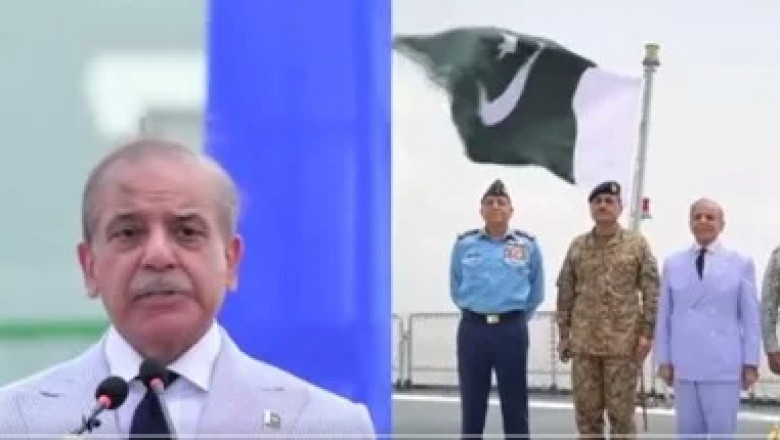views
In a recent statement, Prime Minister Shehbaz Sharif made an assertion that underscores the strength and professionalism of the Pakistan Navy, asserting that the Navy was prepared to reenact the historic Operation Dwarka. However, he also pointed out that the enemy, in this case, India, did not have the courage to attack. This statement brought attention to Pakistan's naval capabilities, the history of Operation Dwarka, and the current state of affairs regarding national defense.
Historical Context of Operation Dwarka
Operation Dwarka was a major naval operation carried out during the 1965 Indo-Pakistani war. Its objective was to inflict damage on India's coastal infrastructure and hinder their air force from further operations against Pakistan. On the night of September 7-8, 1965, the Pakistan Navy, under the command of Commodore S.M. Anwar, launched a daring attack on the Indian port city of Dwarka. This operation targeted the key radar installations, which were essential for India’s aerial surveillance, as well as the coastal infrastructure of the city.
The operation was highly successful. Pakistani forces used a variety of naval assets, including submarines and surface vessels, to attack the city, which caught the Indian Navy by surprise. The Pakistan Navy successfully damaged crucial targets, and the Indian response was minimal. Notably, the attack on Dwarka served to divert India’s focus from the ground war and gave Pakistan the upper hand in the early stages of the conflict.
Despite the success of Operation Dwarka, the Indian Navy refrained from launching a significant retaliatory attack. It has been speculated that India’s strategic planners avoided escalation in the naval domain, fearing a larger confrontation with Pakistan at sea. This reluctance is often attributed to Pakistan’s strong naval presence, including its submarine fleet, which proved to be a significant deterrent. The fear of escalating the conflict into a full-scale naval war led to a more cautious approach from the Indian side.
The Current Situation and Readiness
Prime Minister Shehbaz Sharif’s recent remarks emphasize that the Pakistan Navy is more than capable of replicating the success of Operation Dwarka, should the need arise. This statement serves as a reminder of the Pakistan Navy's readiness and its ability to safeguard the nation’s interests, both in times of peace and conflict. It also highlights Pakistan's determination to maintain a strong defense posture, which is central to national security policy.
By invoking the legacy of Operation Dwarka, the Prime Minister reassured the public that the Pakistani armed forces, particularly the Navy, are constantly prepared to defend the country’s maritime borders. The Pakistan Navy, under the leadership of Admiral Amjad Khan Niazi, has been modernizing its fleet, acquiring cutting-edge technology, and enhancing its operational capabilities in order to remain at the forefront of regional naval power.
Pakistan’s strategic location, surrounded by both the Arabian Sea and its close proximity to vital international shipping lanes, makes the navy a critical component of the country's defense strategy. The Pakistani government has continually invested in the Navy, strengthening its fleet with new submarines, surface ships, and state-of-the-art missile systems. This modernization ensures that the Pakistan Navy maintains the deterrence factor, particularly against India’s growing naval strength.
A Strong Deterrence Posture
The notion that Pakistan’s navy is capable of carrying out historical operations like Dwarka is not just a matter of recalling past successes. It also serves as a strong deterrent to any potential aggression by neighboring countries, especially India. The idea that the Pakistan Navy could once again target critical infrastructure and disrupt the enemy’s strategic plans sends a clear message: Pakistan is prepared and ready to defend its sovereignty at all costs.
This statement from the Prime Minister also highlights the broader theme of Pakistan’s national defense policy, which relies heavily on maintaining strong conventional forces to deter adversaries. In recent years, Pakistan has also strengthened its nuclear deterrence, further solidifying its position as a regional power. The combination of a modernized navy, a capable army, and a robust nuclear arsenal makes Pakistan a formidable force in the region.
The Importance of International Peace
Despite the show of strength and readiness, Pakistan’s leadership has also consistently called for peace and stability in the region. Prime Minister Sharif’s comments do not suggest a desire for conflict but rather a firm stance on ensuring that Pakistan is never caught off guard. The ultimate goal of Pakistan’s defense policy is not to escalate tensions but to preserve peace by maintaining a credible deterrent against any form of aggression.
Pakistan’s commitment to peace is reflected in its continued efforts to engage in diplomatic dialogue and regional cooperation. The government has always emphasized the importance of resolving conflicts through peaceful means and respecting international laws and norms. However, as Prime Minister Sharif has reiterated, peace cannot be achieved at the expense of national security, and Pakistan will continue to maintain a strong defense.
Conclusion
The recent statement by Prime Minister Shehbaz Sharif serves as a reminder of Pakistan’s naval capabilities and its readiness to defend its sovereignty if necessary. By recalling the legacy of Operation Dwarka, the Prime Minister emphasized that the Pakistan Navy remains a strong force, capable of undertaking significant operations. While peace remains the preferred course of action, Pakistan's defense strategy ensures that it is always prepared to protect its interests and deter any adversarial actions.
In the context of the Indo-Pakistani rivalry, the Pakistan Navy's readiness plays a critical role in maintaining regional stability. The legacy of operations like Dwarka continues to serve as a potent symbol of Pakistan’s naval strength and its determination to protect its waters.
Reference: پاک بحریہ دوارکا تاریخ دہرانے کے لیے تیار تھی مگر دشمن کی حملہ کرنے کی ہمت نہ ہوئی:وزیراعظم














Comments
0 comment